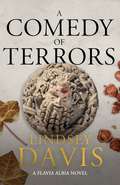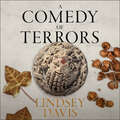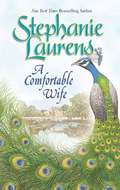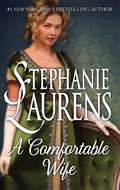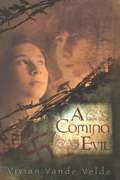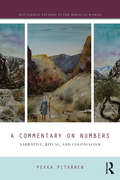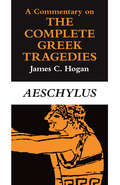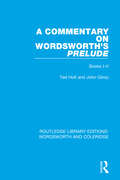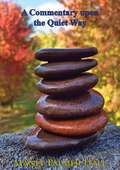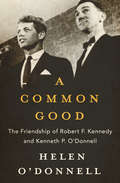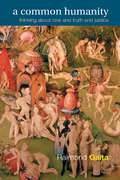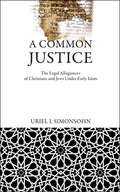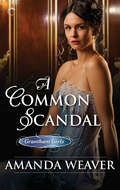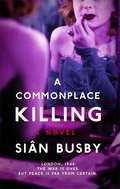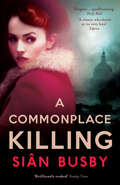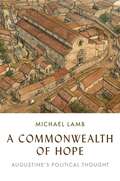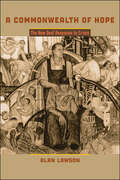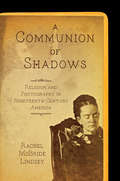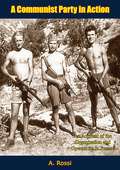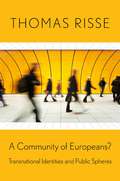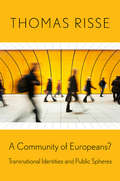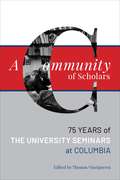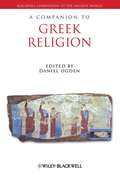- Table View
- List View
A Comedy of Terrors: The Sunday Times Crime Club Star Pick (Flavia Albia)
by Lindsey Davis***The Sunday Times Crime Club Star Pick***'Lighthearted, witty and effortlessly clever, just like its wonderful heroine, this is a window into ancient Rome, and a tonic and a joy to read' The Observer'It positively crackles with knowledge of the city and its people, mixed with social comment, ingenious and bloody plots and sharp observational skills leavened by more than a smattering of genuine and sometimes earthy humour' Crime ReviewSaturnalia, the Romans' mid-December feast, nominally to celebrate the sun's rebirth but invariably a drunken riot. Flavia Albia needs a case to investigate, but all work is paused.The Aventine is full of fracturing families. Wives plot to leave their husbands, husbands plot to spend more time with their mistresses. Masters must endure slaves taking obscene liberties, while aggressive slaves are learning to ape dangerous masters. But no one wants to hire an investigator during the holiday.Albia is lumped with her own domestic stress: overexcited children and bilious guests, too many practical jokes, and her magistrate husband Tiberius preoccupied with local strife. He fears a Nut War. Nuts are both the snack and missile of choice of tipsy celebrants, so there is a fortune to be made. This year a hustling gang from the past is horning in on the action.As the deadly menace strikes even close to home, and with law and order paused for partying, Albia and Tiberius must go it alone. The Emperor has promised the people a spectacular entertainment - but Domitian himself is a target for the old criminals' new schemes. Can the Undying Sun survive the winter solstice, or will criminal darkness descend upon Rome?Praise for Lindsey Davis and the Flavia Albia series'For a totally exhilarating romp through Ancient Rome, Lindsey Davis' latest Flavia Alba novel won't be beaten and offers an immersive experience of a vibrant world full of real, recognisable characters' Shotsmag'In this witty novel by the mistress of Roman crime, the reader is transported behind the scenes of a Triumph into a fascinating world of actors, costumiers and animal trainers, all united in their hatred of the murdered man' Sunday Express Magazine'Davis does her usual brilliant job of integrating the history of the period, warts and all, with a fast-paced and fair whodunit' Publishers Weekly
A Comedy of Terrors: The Sunday Times Crime Club Star Pick (Flavia Albia)
by Lindsey DavisThe next book in the thrilling Flavia Albia series, by acclaimed author Lindsey Davis.Saturnalia, the Romans' mid-December feast, nominally to celebrate the sun's rebirth but invariably a drunken riot. Flavia Albia needs a case to investigate, but all work is paused. The Aventine is full of fracturing families. Wives plot to leave their husbands, husbands plot to spend more time with their mistresses. Masters must endure slaves taking obscene liberties, while aggressive slaves are learning to ape dangerous masters. But no one wants to hire an investigator during the holiday. Albia is lumped with her own domestic stress: overexcited children and bilious guests, too many practical jokes, and her magistrate husband Tiberius preoccupied with local strife. He fears a Nut War. Nuts are both the snack and missile of choice of tipsy celebrants, so there is a fortune to be made. This year a hustling gang from the past is horning in on the action.As the deadly menace strikes even close to home, and with law and order paused for partying, Albia and Tiberius must go it alone. The Emperor has promised the people a spectacular entertainment - but Domitian himself is a target for the old criminals' new schemes. Can the Undying Sun survive the winter solstice, or will criminal darkness descend upon Rome?(P) 2021 Hodder & Stoughton Ltd
A Comfortable Wife
by Stephanie LaurensAntonia Mannering refused to become an old maid!She was a young woman with plans, and Lord Philip Ruthven played a large part in them. Though the childhood friends had not seen one another in years, she was perfectly aware that Philip had no lack of female companionship. But he had never married, and it was high time he did. If she could prove to him that she was capable of running his home and would not disgrace him in society, Antonia was certain he would propose a comfortable arrangement. But never had she expected that their hearts would somehow find their way into the bargain!
A Comfortable Wife
by Stephanie LaurensRediscover this classic tale of Regency romance by #1 New York Times bestselling author Stephanie Laurens.Miss Antonia Mannering had made plans, and Lord Philip Ruthven played a large part in them. They had been childhood friends, but had not seen each other for years. She knew Philip was popular with the ladies, but he had never married any of them. Wouldn’t he now be ready for a wife? If she could prove to him that she could run his home, not disgrace him in Society and be a comfortable wife for him, surely he would be prompted to propose to her. But she never expected that love and passion would enter into their arrangement!Originally published in 1996
A Comfortable Wife (Regency #5)
by Stephanie LaurensAntonia was not going to dwindle into an old maid. . . . Miss Antonia Mannering had made plans, and Lord Philip Ruthven played a large part in them. They had been childhood friends, but had not seen each other for years. She knew Philip was popular with the ladies, but he had never married any of them. Wouldn't he now be ready for a wife? If she could prove to him that she could run his home, not disgrace him in Society and be a comfortable wife for him, surely he would be prompted to propose to her. That they might fall in love had never occurred to her!
A Coming Evil
by Vivian Vande Velde"This well-written . . . fast-paced adventure raises some interesting issues." -School Library JournalLisette Beaucaire was angry when her parents sent her away from Paris that September day in 1940. And although she knew that with the Nazis occupying the city she'd be safer at her aunt Josephine's farm in the Dordogne Valley, Lisette resented her "exile." She'd miss her friends and the excitement of being thirteen and starting a new school. Instead, she'd have nothing to do but amuse her little cousin Cecile. <P><P>That's what Lisette thought, but she soon found out that she wasn't the only visitor at the farmhouse. And then she encountered Gerard, a visitor from a long time ago, who proved to be a valiant ally at a crucial moment.
A Commentary on Numbers: Narrative, Ritual, and Colonialism (Routledge Studies in the Biblical World)
by Pekka PitkänenThis book provides a new reading of the biblical book of Numbers in a commentary form. Mainstream readings have tended to see the book as a haphazard junkyard of material that connects Genesis–Leviticus with Deuteronomy (and Joshua), composed at a late stage in the history of ancient Israel. By contrast, this book reads Numbers as part of a wider work of Genesis–Joshua, a carefully crafted programmatic settler colonial document for a new society in Canaanite highlands in the late second millennium BCE that seeks to replace pre-existing indigenous societies. In the context of the tremendous influence that the biblical documents have had on the world in the last 2,000–3,000 years, the book also offers pointers towards reading these texts today. This volume is a fascinating study of this text, and will be of interest not only to biblical scholars, but to anyone with an interest in the history of the ancient Levant, and colonisation and colonialism in the ancient world more broadly.
A Commentary on The Complete Greek Tragedies: Aeschylus
by James C. HoganThis commentary offers a rich introduction and useful guide to the seven surviving plays attributed to Aeschylus. Though it may profitably be used with any translation of Aeschylus, the commentary is based on the acclaimed Chicago translations, The Complete Greek Tragedies, edited by David Grene and Richmond Lattimore. James C. Hogan provides a general introduction to Aeschylean theater and drama, followed by a line-by-line commentary on each of the seven plays. He places Aeschylus in the historical, cultural, and religious context of fifth-century Athens, showing how the action and metaphor of Aeschylean theater can be illuminated by information on Athenian law athletic contests, relations with neighboring states, beliefs about the underworld, and countless other details of Hellenic life. Hogan clarifies terms that might puzzle modern readers, such as place names and mythological references, and gives special attention to textual and linguistic issues: controversial questions of interpretation; difficult or significant Greek words; use of style, rhetoric, and commonplaces in Greek poetry; and Aeschylus's place in the poetic tradition of Homer, Hesiod, and the elegiac poets. Practical information on staging and production is also included, as are maps and illustrations, a bibliography, indexes, and extensive cross-references between the seven plays. Forthcoming volumes will cover the works of Sophocles and Euripides.
A Commentary on Wordsworth's Prelude: Books I-V (RLE: Wordsworth and Coleridge #5)
by Ted Holt John GilroyFirst published in 1983, this books aims to guide Wordsworth students through his difficult masterpiece by reading it in continuous sequence and making its sense emerge. The special value of this commentary is that it explains the structure of The Prelude by encouraging study of the poem as a continuous whole rather than selectively looking at individual sections — an approach that has typified modern criticism of the work. This depends upon a close attention to the careful arrangement of the verse paragraphs, all of which make an indispensable contribution to the overall thought pattern, thus leading to a fuller appreciation and understanding of the poem.
A Commentary upon the Quiet Way
by Manly Palmer HallPractical suggestions are given for cultivating the quiet way and attaining peace of mind based on ancient Chinese text attributed to a saintly recluse who took the religious name Wen Ch'ang, who flourished during the Tang dynasty.Manly P. Hall (1901-1990) founded the Philosophical Research Society in 1934, a non-profit organization dedicated to the dissemination of useful knowledge in the fields of philosophy, comparative religion and psychology. In his long career, spanning more than 70 years of dynamic public activity, Mr. Hall delivered over 8000 lectures in the United States and abroad, authored over 150 books and essays, and wrote countless magazine articles.Many of Mr. Hall's lectures have been transcribed and are available as pamphlets; others were taped live, and the audio recordings are available on CD's as well. He is perhaps best known for his 1928 classic, "The Secret Teachings of All Ages," an encyclopedia of the world's wisdom traditions and symbolic disciplines.Today, younger generations are re-discovering the works and words of Manly Hall, finding that the material he put forth so many years ago is still relevant and useful today. Mr. Hall's hope for humanity was to learn from the greatest minds of all times so that we may solve current problems - both in society and in the individual - today.-Print ed.
A Common Good: The Friendship of Robert F. Kennedy and Kenneth P. O'Donnell
by Helen O'DonnellAn illuminating account of the history-making friendship between RFK and the chief of staff to JFK—a bond built on shared ideals, but severed by tragedy. When they first met at Harvard in 1946, young Bobby Kennedy and Kenny O&’Donnell could not have imagined where their lives would take them. Teammates on both the football and debate teams, they formed a partnership that would sustain them through the years, from Robert Kennedy&’s tenure as attorney general to O&’Donnell&’s years as John F. Kennedy&’s chief of staff. Together they lived, worked, and struggled through some of the most pivotal moments of the twentieth century, including the assassination of JFK in Dallas. Their harmonious relationship was cut short only by Bobby&’s own tragic death. With full access to the Kennedy family archives, Helen O&’Donnell brings an inspiring personal and political alliance to life. With A Common Good, she amply fulfills the promise she made to her late father to honor and preserve his memories of Robert F. Kennedy for future generations. Kirkus Reviews hails A Common Good as &“a moving and intimate study of a unique friendship but also of the time and place, now long ago, in which this friendship formed and blossomed.&” O&’Donnell &“set out to write &‘a good book about two good men.&’ In this she has succeeded.&”
A Common Humanity: Thinking about Love and Truth and Justice
by Raimond GaitaThe Holocaust and attempts to deny it, racism, murder, the case of Mary Bell. How can we include these and countless other examples of evil within our vision of a common humanity? These painful human incongruities are precisely what Raimond Gaita boldly harmonizes in his powerful new book, A Common Humanity.Hatred with forgiveness, evil with love, suffering with compassion, and the mundane with the precious. Gaita asserts that our conception of humanity cannot be based upon the empty language of individual rights when it is our shared feelings of grief, hope, love, guilt, shame and remorse that offer a more potent foundation for common understanding. Drawing on the work of Hannah Arendt, Simon Weil, Primo Levi, George Orwell, Iris Murdoch and Sigmund Freud, Gaita creates a beautifully written and provocative new picture of our common humanity.
A Common Justice: The Legal Allegiances of Christians and Jews Under Early Islam (Divinations: Rereading Late Ancient Religion)
by Uriel I. SimonsohnIn A Common Justice Uriel I. Simonsohn examines the legislative response of Christian and Jewish religious elites to the problem posed by the appeal of their coreligionists to judicial authorities outside their communities. Focusing on the late seventh to early eleventh centuries in the region between Iraq in the east and present-day Tunisia in the west, Simonsohn explores the multiplicity of judicial systems that coexisted under early Islam to reveal a complex array of social obligations that connected individuals across confessional boundaries. By examining the incentives for appeal to external judicial institutions on the one hand and the response of minority confessional elites on the other, the study fundamentally alters our conception of the social history of the Near East in the early Islamic period.Contrary to the prevalent scholarly notion of a rigid social setting strictly demarcated along confessional lines, Simonsohn's comparative study of Christian and Jewish legal behavior under early Muslim rule exposes a considerable degree of fluidity across communal boundaries. This seeming disregard for religious affiliations threatened to undermine the position of traditional religious elites; in response, they acted vigorously to reinforce communal boundaries, censuring recourse to external judicial institutions and even threatening transgressors with excommunication.
A Common Scandal
by Amanda WeaverFinishing school taught Amelia Wheeler how to put on a well-mannered performance--when she's not bored and looking for trouble. Lady Grantham's is behind her and now it's time for Amelia to keep her promise to her dying mother: marry a title and leave her wild days behind.That promise would be much easier to keep if Nate Smythe hadn't just reappeared in a London ballroom. The son of an impoverished sailor, Nate--Natty, as he used to be called--has grown up to become handsome, rich and polished. He claims to be looking for a proper bride who can advance his business interests, but that doesn't stop him from seeking out Amelia every chance he gets. Challenging her. Kissing her.Suddenly, struggling against her simmering passion is the least of Amelia's problems--one of her titled suitors is hiding a desperate secret that could stop Amelia from pleasing her parents or finding happiness with Nate. As a weeklong house party threatens to derail her hard-won future, Amelia must decide: fight against disaster or act like the lady she's promised to become?This book is approximately 86,000 wordsBook two of The Grantham Girls
A Commonplace Killing
by Sian BusbySet in the bleakness and confusion of post-WWII London, this gripping psychological thriller unravels the double life of a seemingly proper middle-class woman found strangled to death.On a damp July morning in 1946, two schoolboys find a woman's body in an abandoned churchyard in Holloway, north London. She had been strangled and left on a pile of rubble with her clothes and handbag left intact. The police assume that the victim, identified as Lillian Parry, was the random victim of an ex-serviceman looking for a cheap thrill, but the autopsy finds no evidence of sexual assault. The mysterious case sets Divisional Detective Inspector Jim Cooper on a mad search for answers to the many questions surrounding the woman's private life: How did Lil, who lived nearby with her family, come to be in the churchyard--a well-known lovers' haunt? If she hadn't been raped, why was she strangled? How could her husband have failed to notice that she never came home on the night she was murdered? As DDI Cooper unravels the case, the facts point to a postwar world of disillusionment, bitterness, and emotional disturbance--a world where getting back to normal proves far more difficult than the cheerful optimism that the news reels suggest... Brilliantly plotted, fast-paced, and utterly suspenseful, A Commonplace Killing interweaves an account of Lil's last day with the mystery of the investigation into her murder. What results is a sweeping journey through post-war London that will intrigue and shock you through the very last page.
A Commonplace Killing: A Novel
by Sian BusbyOn a damp July morning in 1946, two schoolboys find a woman"s body in a bomb site in north London. In this gripping murder story, Sian Busby gradually peels away the veneer of stoicism and respectability to reveal the dark truths at the heart of postwar austerity Britain.
A Commonwealth of Hope: Augustine's Political Thought
by Michael LambA bold new interpretation of Augustine&’s virtue of hope and its place in political lifeWhen it comes to politics, Augustine of Hippo is renowned as one of history&’s great pessimists, with his sights set firmly on the heavenly city rather than the public square. Many have enlisted him to chasten political hopes, highlighting the realities of evil and encouraging citizens instead to cast their hopes on heaven. A Commonwealth of Hope challenges prevailing interpretations of Augustinian pessimism, offering a new vision of his political thought that can also help today&’s citizens sustain hope in the face of despair.Amid rising inequality, injustice, and political division, many citizens wonder what to hope for in politics and whether it is possible to forge common hopes in a deeply polarized society. Michael Lamb takes up this challenge, offering the first in-depth analysis of Augustine&’s virtue of hope and its profound implications for political life. He draws on a wide range of Augustine&’s writings—including neglected sermons, letters, and treatises—and integrates insights from political theory, religious studies, theology, and philosophy. Lamb shows how diverse citizens, both religious and secular, can unite around common hopes for the commonwealth.Recovering this understudied virtue and situating Augustine within his political, rhetorical, and religious contexts, A Commonwealth of Hope reveals how Augustine&’s virtue of hope can help us resist the politics of presumption and despair and confront the challenges of our time.
A Commonwealth of Hope: The New Deal Response to Crisis (The American Moment)
by Alan LawsonDid the New Deal represent the true American way or was it an aberration that would last only until the old order could reassert itself? This original and thoughtful study tells the story of the New Deal, explains its origins, and assesses its legacy. Alan Lawson explores how the circumstances of the Great Depression and the distinctive leadership of Franklin D. Roosevelt combined to bring about unprecedented economic and policy reform. Challenging conventional wisdom, he argues that the New Deal was not an improvised response to an unexpected crisis, but the realization of a unique opportunity to put into practice Roosevelt’s long-developed progressive thought. Lawson focuses on where the impetus and plans for the New Deal originated, how Roosevelt and those closest to him sought to fashion a cooperative commonwealth, and what happened when the impulse for collective unity was thwarted. He describes the impact of the Great Depression on the prevailing system and traces the fortunes of several major social sectors as the drive to create a cohesive plan for reconstruction unfolded. He continues the story of these main sectors through the last half of the 1930s and traces their legacy down to the present as crucial challenges to the New Deal have arisen. Drawing from a wide variety of scholarly texts, records of the Roosevelt administration, Depression-era newspapers and periodicals, and biographies and reflections of the New Dealers, Lawson offers a comprehensive conceptual base for a crucial aspect of American history.
A Commonwealth of Hope: The New Deal Response to Crisis (The American Moment)
by Alan LawsonWas the New Deal an aberration in American history? This look at its origins and legacy is “truly refreshing . . . the author makes a good case for his ideas” (Journal of Economic History).Did the New Deal represent the true American way or was it an aberration that would last only until the old order could reassert itself? This original and thoughtful study tells the story of the New Deal, explains its origins, and assesses its legacy. Alan Lawson explores how the circumstances of the Great Depression and the distinctive leadership of Franklin D. Roosevelt combined to bring about unprecedented economic and policy reform. Challenging conventional wisdom, he argues that the New Deal was not an improvised response to an unexpected crisis, but the realization of a unique opportunity to put into practice Roosevelt’s long-developed progressive thought.Lawson focuses on where the impetus and plans for the New Deal originated, how Roosevelt and those closest to him sought to fashion a cooperative commonwealth, and what happened when the impulse for collective unity was thwarted. He describes the impact of the Great Depression on the prevailing system and traces the fortunes of several major social sectors as the drive to create a cohesive plan for reconstruction unfolded. He continues the story of these main sectors through the last half of the 1930s and traces their legacy down to the present as crucial challenges to the New Deal have arisen.Drawing from a wide variety of scholarly texts, records of the Roosevelt administration, Depression-era newspapers and periodicals, and biographies and reflections of the New Dealers, Lawson offers a comprehensive conceptual base for a crucial aspect of American history.
A Communion of Shadows: Religion and Photography in Nineteenth-Century America
by Rachel McBride LindseyWhen the revolutionary technology of photography erupted in American culture in 1839, it swiftly became, in the day's parlance, a "mania." This richly illustrated book positions vernacular photography at the center of the study of nineteenth-century American religious life. As an empirical tool, photography captured many of the signal scenes of American life, from the gold rush to the bloody battlefields of the Civil War. But photographs did not simply display neutral records of people, places, and things; rather, commonplace photographs became inscribed with spiritual meaning, disclosing, not merely signifying, a power that lay beyond.Rachel McBride Lindsey demonstrates that what people beheld when they looked at a photograph had as much to do with what lay outside the frame--theological expectations, for example--as with what the camera had recorded. Whether studio portraits tucked into Bibles, postmortem portraits with locks of hair attached, "spirit" photography, stereographs of the Holy Land, or magic lanterns used in biblical instruction, photographs were curated, beheld, displayed, and valued as physical artifacts that functioned both as relics and as icons of religious practice. Lindsey's interpretation of "vernacular" as an analytic introduces a way to consider anew the cultural, social, and material reach of religion.A multimedia collaboration with MAVCOR—Center for the Study of Material & Visual Cultures of Religion—at Yale University.
A Communist Party in Action: An Account of the Organization and Operations in France
by A. Rossi Dr Willmoore KendallRecent events in the United States have shown the workings of little-known elements of the Communist Party, like the secret section whose members are unknown to the rank and file. All this and much more is explained in Rossi’s remarkable disclosure of the entire structure of the Communist Party of one country—in this case France—where we are able to see the Party as it acted under the varying pressures of peace, war, and armistice; how it operates as a legal part of the political scene; how readily it can go underground; how the members are schooled in its principles (an hour-a-day reading of the primary Party books is required); how the overall directives are issued and carried out; how a mass following was to be recruited from the disaffected veterans of the lost war, distraught housewives and families of prisoners, from labor unions and peasants in the Catholic hinterland.This book, based on published and unpublished sources, provides a vast fund of information about the whole range of Communist activities, from the secret instructions that foresaw, in the early days of the German occupation, that the Nazi tolerance of the Party in France would be short-lived to advice on how to meet a comrade with the least chance of being observed. It shows why Party members returning from prison must always be regarded with suspicion, and how and through what means the eventual seizure of the government was to take place. These observations are based on the operations of the French Communist Party, but they apply with only minor changes to the Communist parties of all the Western countries, with their dexterous capacity for maneuver and their unrelenting pursuit, ruthless and with no holds barred, of the ultimate goal of the seizure of power.
A Community of Europeans? Transnational Identities and Public Spheres
by Thomas RisseIn A Community of Europeans?, a thoughtful observer of the ongoing project of European integration evaluates the state of the art about European identity and European public spheres. Thomas Risse argues that integration has had profound and long-term effects on the citizens of EU countries, most of whom now have at least a secondary "European identity" to complement their national identities. Risse also claims that we can see the gradual emergence of transnational European communities of communication. Exploring the outlines of this European identity and of the communicative spaces, Risse sheds light on some pressing questions: What do "Europe" and "the EU" mean in the various public debates? How do European identities and transnational public spheres affect policymaking in the EU? And how do they matter in discussions about enlargement, particularly Turkish accession to the EU? What will be the consequences of the growing contestation and politicization of European affairs for European democracy?This focus on identity allows Risse to address the "democratic deficit" of the EU, the disparity between the level of decision making over increasingly relevant issues for peoples' lives (at the EU) and the level where politics plays itself out in the member states. He argues that the EU's democratic deficit can only be tackled through politicization and that "debating Europe" might prove the only way to defend modern and cosmopolitan Europe against the increasingly forceful voices of Euroskepticism. "
A Community of Europeans?: Transnational Identities and Public Spheres
by Thomas RisseIn A Community of Europeans?, a thoughtful observer of the ongoing project of European integration evaluates the state of the art about European identity and European public spheres. Thomas Risse argues that integration has had profound and long-term effects on the citizens of EU countries, most of whom now have at least a secondary "European identity" to complement their national identities. Risse also claims that we can see the gradual emergence of transnational European communities of communication. Exploring the outlines of this European identity and of the communicative spaces, Risse sheds light on some pressing questions: What do "Europe" and "the EU" mean in the various public debates? How do European identities and transnational public spheres affect policymaking in the EU? And how do they matter in discussions about enlargement, particularly Turkish accession to the EU? What will be the consequences of the growing contestation and politicization of European affairs for European democracy? This focus on identity allows Risse to address the "democratic deficit" of the EU, the disparity between the level of decision making over increasingly relevant issues for peoples' lives (at the EU) and the level where politics plays itself out--in the member states. He argues that the EU's democratic deficit can only be tackled through politicization and that "debating Europe" might prove the only way to defend modern and cosmopolitan Europe against the increasingly forceful voices of Euroskepticism.
A Community of Scholars: Seventy-Five Years of The University Seminars at Columbia (Columbiana)
by Thomas VinciguerraThe Columbia University Seminars, founded in 1945, represent a distinctive experiment in academia. Scholars from different disciplines and institutions, as well as practitioners and other experts, meet once a month through the academic year to study and discuss subjects, sometimes beyond their specialties. Through collegial discussion, participants learn from one another. Today, over ninety seminars are ongoing: some have outlived their founders, while others are just beginning.A Community of Scholars is a seventy-fifth anniversary celebration of the founding of The University Seminars. It brings together essays by seminar chairs and other leading participants that exemplify the diversity and vibrancy of these proceedings. Their topics are wide-ranging—the evolution of the labor movement, urban life, the politics and culture of Brazil, the Enlightenment, the prospects for world peace—but in each, a commitment to intellectual provocation and shared learning is on full display. An informative introduction explains how The Seminars came into being and why they continue to matter. The volume also features biographical sketches of Frank Tannenbaum, the Latin America scholar and criminologist who founded The Seminars, and his wife, the anthropologist Jane Belo, a close friend of Margaret Mead. Belo and Tannenbaum endowed The Seminars and allowed them to flourish. A remarkable testament to an unparalleled intellectual forum, A Community of Scholars allows readers to share in the eclectic spirit of The Seminars.
A Companion To Greek Religion (Blackwell Companions To The Ancient World #27)
by Daniel OgdenThis major addition to Blackwell’s Companions to the Ancient World series covers all aspects of religion in the ancient Greek world from the archaic, through the classical and into the Hellenistic period. Written by a panel of international experts Focuses on religious life as it was experienced by Greek men and women at different times and in different places Features major sections on local religious systems, sacred spaces and ritual, and the divine
